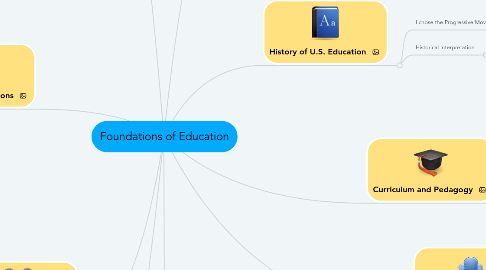Foundations of Education
by chaka hutcheson

1. Politics of Education
1.1. Four Purposes of Education
1.2. Political
1.2.1. instill allegiance to political order
1.2.1.1. prepare students to participate in political order
1.2.1.1.1. help instill diverse cultural groups into a common political order
1.3. Social
1.3.1. help solve social problems,
1.3.1.1. work as an institution to ensure social cohesiveness
1.3.1.1.1. socialize to different behaviors,roles and values
1.4. Economic
1.4.1. prepare students for their occupational roles
1.4.1.1. train, allocate, and select student into the division of labor
1.5. Intellectual
1.5.1. teach basic cognitive skills to transmit knowledge
1.5.1.1. help gain higher-order thinking
1.6. Perspectives
1.7. Role of the School
1.7.1. liberal perspective-focuses on education equality for every student
1.7.1.1. everyone has the opportunity for economic, political and social growth
1.8. Explanations of unequal performance
1.8.1. liberal perspective- there are individuals and groups of students that start out with a disadvantage
1.8.1.1. this can be due to socioeconomic status or cognitive impairment
1.8.1.1.1. liberal perspective helps make policies for children to have a better chance at succeeding
1.9. Definition of Educational Problems
1.9.1. liberal perspective- poor and minority children have limited life chances
1.9.1.1. too much emphasis on discipline
1.9.1.1.1. limited teacher role as a developer of individuals with inequalities
2. Educational Reform
3. History of U.S. Education
3.1. I chose the Progressive Movement
3.1.1. associated with John Dewey
3.1.1.1. advocates for the student and their interests
3.1.1.1.1. active learning
3.2. Historical interpretation
3.2.1. I chose the Democratic-Liberal School
3.2.1.1. equality of opportunity to all
3.2.1.1.1. school was not just for the elite
4. Curriculum and Pedagogy
5. Equality of Opportunity
6. Educational Inequality
7. Philosophy of Education
7.1. Pragmatism:
7.2. American philosophy
7.3. asks individuals to find ways that work to achieve a desired result
7.4. pragmatists are action-oriented, grounded and ask questions
7.5. concerned with current issues and finding solutions
7.6. Key Researchers:
7.7. George Sanders Pierce
7.8. William James
7.9. John Dewey
7.10. Europeans:
7.11. John Locke
7.12. Frances Bacon
7.13. Jean-Jaques Rousseau
7.14. Generic Notions:
7.15. influenced by theory of evolution and 18th cent. belief in progress
7.16. education was important for a better society
7.17. children needed to study courses that reflected the stages of development
7.18. Goal of Education;
7.19. improve social order
7.20. prepare kids for life
7.21. social reform improvement
7.22. balance needs of society and community on one hand and the individual on the other
7.23. Role of Teacher:
7.24. facilitator
7.25. help, plan and use courses of study
7.26. writes curriculum
7.27. has command of multiple disciplines
7.28. implement the curriculum
7.29. Method of Instruction:
7.30. problem solving or inquiry method
7.31. individual study, problem solving and the project method
7.32. Curriculum:
7.33. subject matter was connected to each course (integrated)
7.34. changed as the students interests and needs became different
8. Schools as Organizations
8.1. Major Stakeholders in my District ( 4 )
8.2. Fed. Senators: Richard Shelby & Doug Jones
8.3. Fed Hse of Rep: Robert Aderholt
8.4. State Sen: Paul Bussman
8.5. State Hse. of Rep: Robert Aderholt
8.6. State Superintendent of Ed: Dr. Ed Richardson
8.7. State School Bd. Rep: Yvette M. Richardson, Ed. D.
8.8. Local Superintendent: Dr. Holly Sutherland
8.9. Haleyville City School Bd. Members: Kris Burleson, Barry Burleson, Steve Stott, Donna Jones, Beth McAlpine
8.10. School Processes and School Cultures:
8.11. qualities such as emotional recall with positive outcomes, becoming centered on the learner's needs, this establishes learning opportunities that give rise to ind. talent and learning patterns, this central core leads to accountability, collaboration, and shares the responsibility of shared decision making.
9. Sociological Perspectives
9.1. Theoretical Perspectives
9.2. Functionalism
9.3. theory developed by Durkheim
9.4. agreement is normal
9.5. conflict shows a breakdown of shared values
9.6. looks at the interdependence of a social system
9.7. Conflict Theory
9.8. dominant groups push their agenda on subordinate groups
9.9. do this by using manipulation and/or force
9.10. believes in power (economic, political, cultural and military
9.11. Interactionalism
9.12. a summing up of functional and perspective theories
9.13. looks at what is not asked
9.14. Five effects of schooling that have had the greatest impact on students
9.15. 1. Education and Mobility
9.16. The upper class do have a better chance of upward mobility. This is due to some schools being more prestigious. Those in the upper class never lose their status even if they do not attend an institution for higher learning. Social mobility does not always come from having an education.
9.17. 2. Inside the Schools
9.18. The curriculum of each school does impact the students. The teachings differ from one school to the next. This is in part due to cultural differences. Test scores also have proven that curriculum does make a difference.
9.19. 3. Inadequate Schools
9.20. Urban schools seem to lack basic supplies and it is harder to serve these children. This type of hardship, on the school districts, makes it harder to present information to the students. Private and suburban schools have more funding and typically are better equipped to bring the whole educational experience to these students.
9.21. 4. Teacher Behavior
9.22. The way in which a teacher behaves, treats and cares about their performance will have a positive effect on the students. When the teacher expects the best from her students, they perform better and have a better outlook on the learning process. On the other hand, if a teacher expects less from any student, especially a minority student, that student usually will always be low achieving.
9.23. 5. Tracking
9.24. This consists of placing students on their abilities, class or race. Tracking will have a negative effect on the success of a student. Every student can learn. It is not up to the educational system or the teacher to "decide" what a child can or can not achieve. Tracking will lead to some students never being allowed to rise to their fullest potential.


